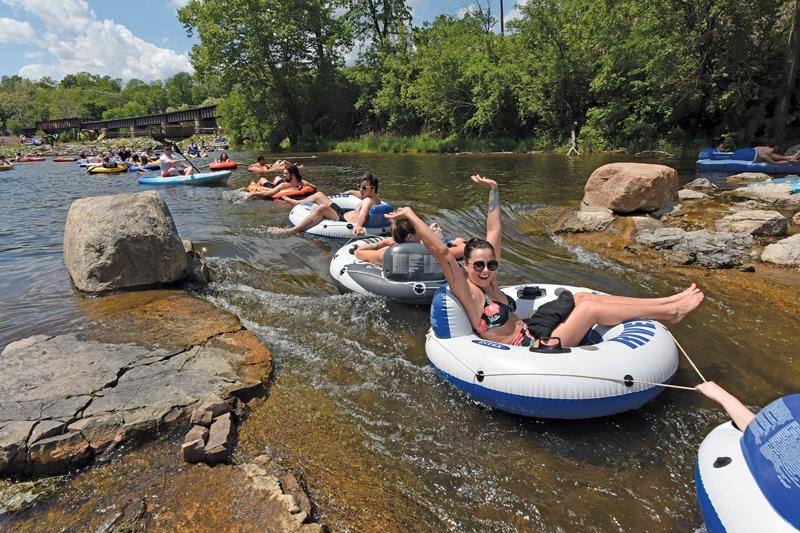Back in the 2000s, the rowing clubs that practiced on Argo Pond helped defeat a plan to remove the dam. Afterward, the city turned its attention to the only part that was failing: the nearly century-old millrace between the pond and the former Detroit Edison powerhouse on Broadway.
The series of pools and small rapids that replaced it was an instant hit. Young people wearing swimsuits and balancing float tubes on their heads are now a regular summer sight in nearby neighborhoods, and many more people drive from farther away, including out of town, to play there.
The crowds and cars have occasionally strained adjacent neighborhoods. Parking in particular has been an issue. The neighborhood to the north now requires residential parking permits on weekends and holidays and during the summer. The city rents a private parking lot up the hill on Longshore. When that created heavy pedestrian traffic along the road, the city made a footpath shortcut through a wooded area. The parks department also coordinates with the police department to have a regular presence on the scene.
“We continue to work with the University of Michigan to promote parking in their Wall Street lots on weekends,” emails city deputy parks and recreation manager Josh Landefeld. “This information is provided on our websites and people are directed there when the Argo lots are full. Through our websites we provide additional parking locations along the river such as Island Park, Mitchell Field, Furstenberg Park as well as Huron High School.”
The city has more than 500 boats available to rent and inner tubes too. There is a reservation system and a limit to the number of river trips. This helps prevent long lines (before it was instituted, wait times had been as long as two hours).
Renters are provided information on safe and proper river use. However, many people bring their own tubes, jump in, and are on their way. On a nice day clumps of them are on the river, often with one hand tethered to the group and the other holding a beverage.
The city has little control over these people, but the police can issue tickets for drinking alcohol on the river (just as in city parks). The Washtenaw County Sheriff’s office has installed a stand with free loaner life jackets on an honor system with no paperwork required.
The city operated a municipal beach at Argo Park from 1917 to 1948, when it closed amid concerns about pollution. By the time the Cascades opened, the water quality had improved, though bacterial counts are still high after heavy rains scour out the city’s storm drains.
People sometimes swim at the crew pier on Argo’s west shore and the boat pier at Barton Pond, though both are marked with “No Swimming” signs. “I think there’s enough community support to bring [a municipal beach] back,” emails former city councilmember Kirk Westphal–though Argo livery manager Cheryl Saam points out that an ordinance forbidding swimming at city parks would need to be changed first.
Success provides challenges but opportunities too for Ann Arbor’s best human-nature collaboration.


